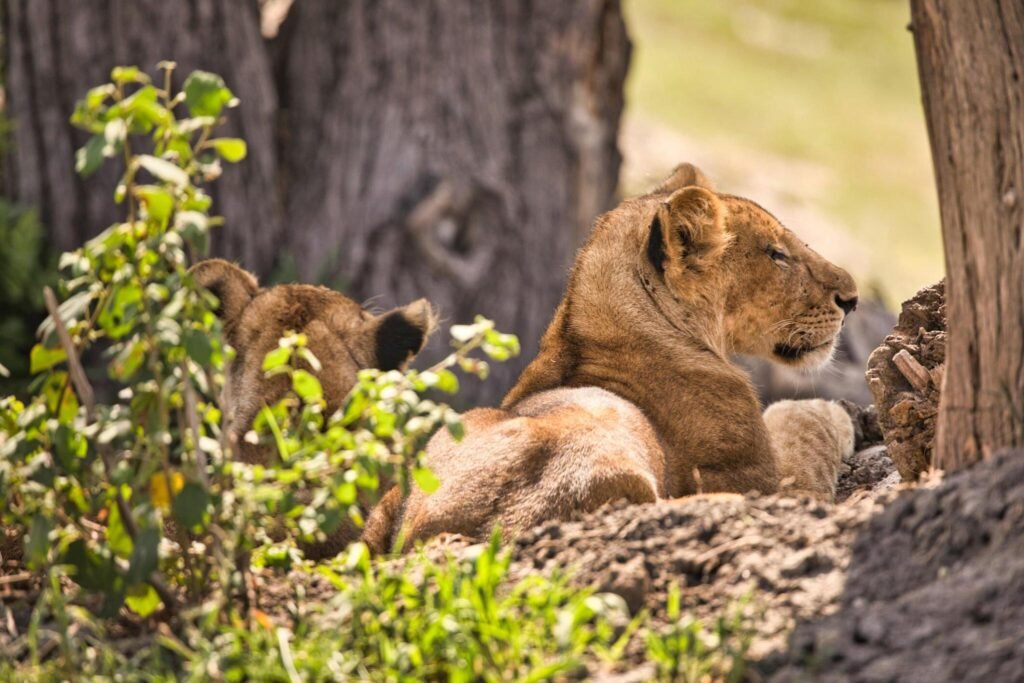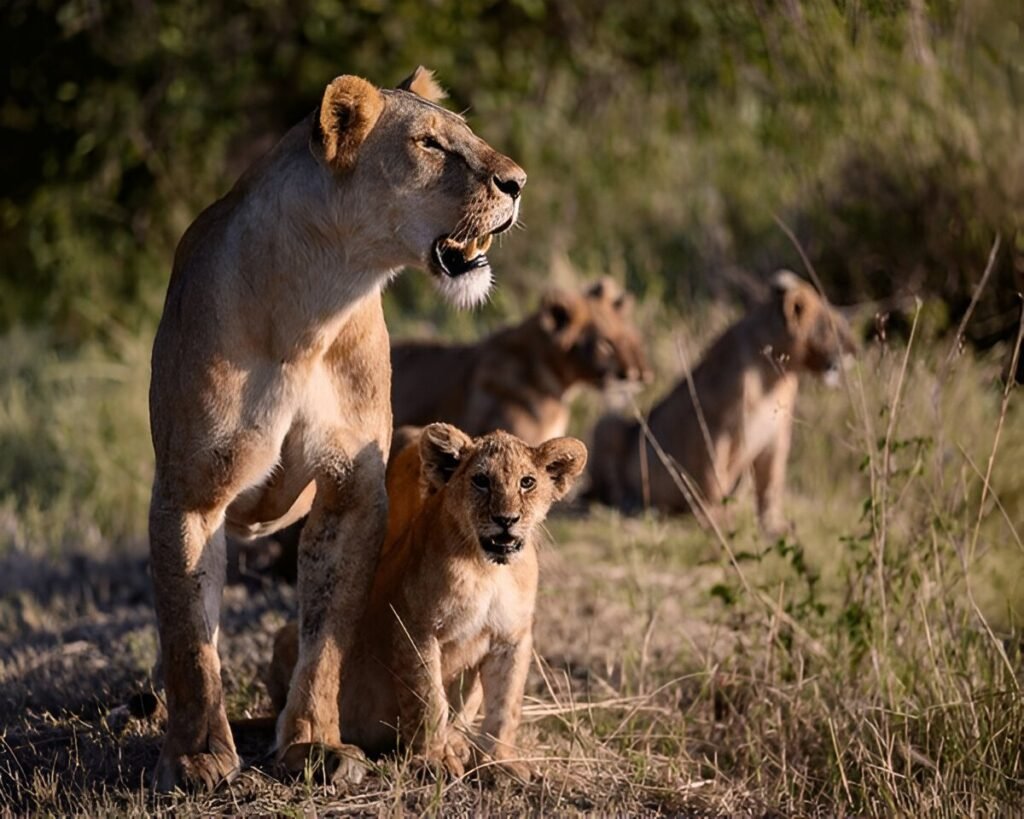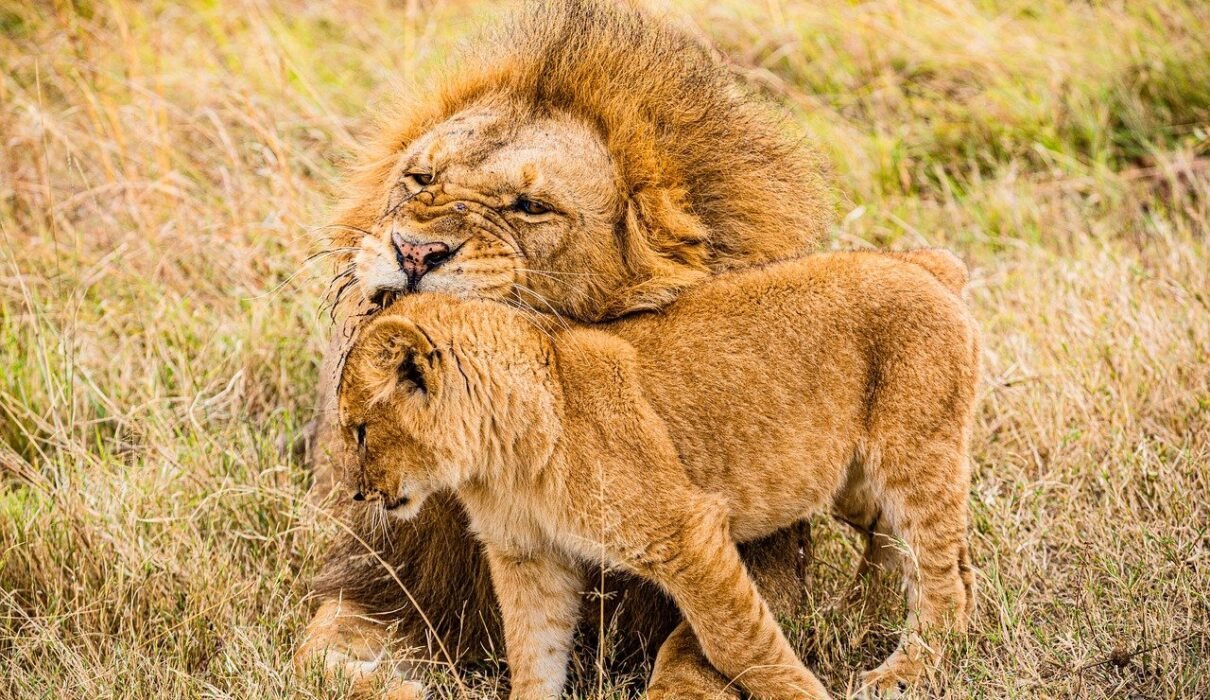10 Interesting Facts About Lions : Lions are among the most iconic animals in Africa, symbolizing strength, power, and majesty. Known as the “king of the jungle,” lions actually roam the open plains and savannas, and their social behavior, hunting skills, and unique characteristics have fascinated humans for centuries. Here are 10 interesting facts about lions that will give you a deeper appreciation for these incredible big cats.
Plan your African safari and witness lions in their natural habitat.

10 Interesting Facts About Lions : Lions Are the Only Social Big Cats
Unlike other big cats, which are solitary, lions are highly social animals. They live in groups called prides, which usually consist of related females, their offspring, and a few adult males. These prides work together to hunt, raise their young, and defend their territory.
- Prides: A typical pride has around 10-15 lions, but some can have as many as 40 members.
Learn more about lion social behavior.
10 Interesting Facts About Lions : Lions Can Roar as Loud as 114 Decibels
One of the most remarkable things about lions is their roar. A lion’s roar can reach up to 114 decibels and can be heard from as far as 5 miles (8 kilometers) away. This powerful roar helps lions communicate with each other across great distances and also serves as a warning to intruders.
- Why They Roar: Roaring helps lions mark their territory and keep rival prides away.
Find out more about lion vocalizations.
10 Interesting Facts About Lions : Male Lions Have Majestic Manes
The iconic mane is one of the most distinguishing features of male lions. A lion’s mane can grow up to 16 centimeters long and varies in color from blonde to black. The mane serves multiple purposes: it makes the lion appear larger and more intimidating, and it also protects the neck during fights with other males.
- What It Signifies: Darker, fuller manes are often a sign of a healthy, dominant lion, making them more attractive to females.
Learn more about the significance of lion manes.
10 Interesting Facts About Lions : Lions Are Apex Predators but Also Scavengers
Lions are at the top of the food chain in their ecosystem, known as apex predators. They hunt large prey such as wildebeest, zebras, and buffalo. However, lions are also opportunistic and will scavenge when given the chance, stealing kills from other animals like hyenas or cheetahs.
- Hunting in Groups: Female lions do most of the hunting, working together to take down prey. Males typically protect the pride’s territory.
Explore more about lion hunting strategies.
10 Interesting Facts About Lions : Lions Are Incredibly Fast for Short Distances
Despite their large size, lions are capable of reaching speeds of up to 50 miles per hour (80 km/h). However, they can only maintain this speed for short distances. This is why lions rely on stealth and teamwork to get as close as possible to their prey before launching an attack.
- Speed vs. Stamina: Lions often stalk their prey, getting within 100 feet (30 meters) before pouncing.
Discover how lions hunt and capture their prey.
10 Interesting Facts About Lions : Lions Rest for Up to 20 Hours a Day
Lions are known for their leisurely lifestyle. They typically rest or sleep for up to 20 hours a day, conserving energy for hunting and protecting their territory. Their bursts of activity are often during the early morning or late evening, as they prefer to avoid the heat of the day.
- Why They Rest So Much: Hunting large animals is energy-intensive, so lions need to save energy by resting as much as possible.
Learn more about lion resting behavior.
10 Interesting Facts About Lions : Cubs Are Raised by the Entire Pride
Lionesses in a pride often give birth around the same time, and all the females work together to care for the cubs. This cooperative parenting ensures the survival of the pride’s young, with lionesses nursing each other’s cubs and teaching them essential survival skills.
- Cub Mortality: Sadly, about 80% of lion cubs do not make it to adulthood, often falling prey to other animals or starvation.
Read more about how lions raise their young.
10 Interesting Facts About Lions : Lions Are Facing a Decline in Population
Despite their status as the “king of the jungle,” lions are considered vulnerable to extinction. In the past 100 years, their population has decreased by about 50%, mainly due to habitat loss, human-wildlife conflict, and poaching. Conservation efforts are in place to protect these majestic creatures, but more work needs to be done.
- Current Population: There are fewer than 20,000 lions left in the wild, with most of them living in Africa.
Find out how you can help lion conservation efforts.
10 Interesting Facts About Lions : Lions Once Lived in Europe and the Americas
While lions are now mostly found in Africa, they once roamed much wider territories. Historical records show that lions lived in parts of Europe, Asia, and even the Americas thousands of years ago. Today, the Asiatic lion is critically endangered and can only be found in a small region of India’s Gir Forest.
- Asiatic Lions: These lions are slightly smaller than their African cousins and have a distinct belly fold.
Learn more about the history of Asiatic lions.
10 Interesting Facts About Lions : Lions Have Few Natural Predators
Lions are apex predators, meaning they are at the top of the food chain and have few natural enemies. However, they still face threats from other animals, especially when defending kills. Hyenas, for example, are known to challenge lions for their food, and crocodiles can pose a threat to lions near water sources.
- Biggest Threats: Apart from humans, lions occasionally face threats from crocodiles and large buffaloes, which can defend themselves against a pride.
Explore the role of lions in their ecosystem.

10 Interesting Facts About Lions : Conclusion
Lions are truly fascinating creatures, known for their strength, social structures, and dominance in the animal kingdom. However, with their population in decline, it’s important to continue efforts to conserve these majestic animals and protect their natural habitats. By learning more about lions, we can better appreciate their role in the ecosystem and support efforts to ensure their survival for future generations.
For expert advice on planning a safari to see lions in the wild, visit Kilimanjaro Climb Specialist or Eddy Tours & Safaris.

